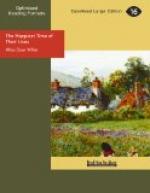“Let us sit here where we can look out,” she said, and sank down on a low sofa drawn under the windows. As she did so she came within the circle of light from the lamp. She sat with her head leaned back against the window-frame, and he saw the fine line of her jaw, the hollows in her cheek, the delicate modeling about her brows, not obscured by much eyebrow, and her long, stretched throat. She was not quite maternal enough to look like a Madonna, but she did look like a saint, he thought.
He knelt with one knee on the couch and peered out.
“Dear me,” he said, “I fancy I used to skate as a boy on a pond just about where that factory is now.”
He found she knew very little about the history of New York. She had been brought up abroad, she said; her father had been a consul in France. It was a subject which he liked to expound. He loved his native city, which he with his own eyes had seen once as hardly more than a village. He and his ancestors—and Mr. Lanley’s sense of identification with his ancestors was almost Chinese—had watched and had a little shaped the growth.
“I suppose you had Dutch ancestry, then,” she said, trying to take an interest.
“Dutch.” Mr. Lanley shut his eyes, resolving, since he had no idea what her own descent might be, that he would not explain to her the superior attitude of the English settlers of the eighteenth century toward their Dutch predecessors. However, perhaps he did not entirely conceal his feeling, for he said: “No, I have no Dutch blood—not a drop. Very good people in their way, industrious—peasants.” He hurried on to the great fire of 1835. “Swept between Wall Street and Coenties Slip,” he said, with a splendid gesture, and then discovered that she had, never heard of “Quenches Slip,” or worse, she had pronounced it as it was spelled. He gently set her right there. His father had often told him that he had seen with his own eyes a note of hand which had been blown, during the course of the conflagration, as far as Flatbush. And the second fire of 1845. His father had been a man then, married, a prominent citizen, old enough, as Mr. Lanley said, with a faint smile, to have lost heavily. He could himself remember the New York of the Civil War, the bitter family quarrels, the forced resignations from clubs, the duels, the draft riots.
But, oddly enough, when it came to contemporary New York, it was Mrs. Wayne who turned out to be most at home. Had he ever walked across the Blackwell’s Island Bridge? (This was in the days before it bore the elevated trains.) No, he had driven. Ah, she said, that was wholly different. Above, where one walked, there was nothing to shut out the view of the river. Just to show that he was not a feeble old antiquarian, he suggested their taking a walk there at once. She held out her trailing garments and thin, blue slippers. And then she went on:
“There’s another beautiful place I don’t believe you know, for all you’re such an old New-Yorker—a pier at the foot of East Eighty-something Street, where you can almost touch great seagoing vessels as they pass.”




